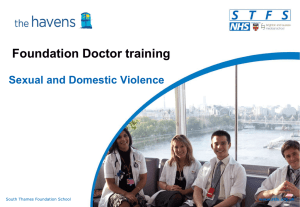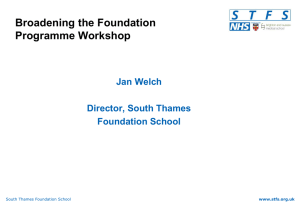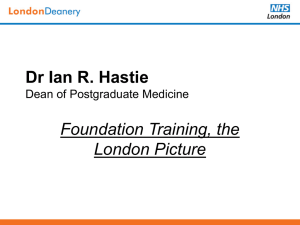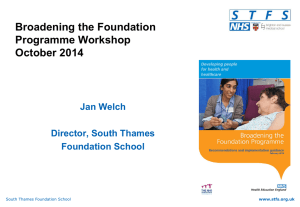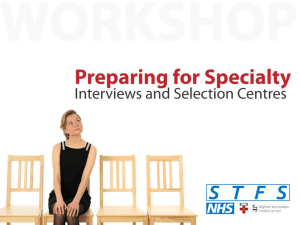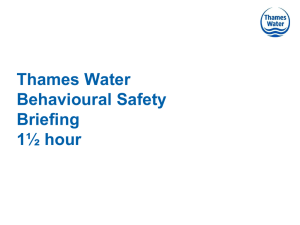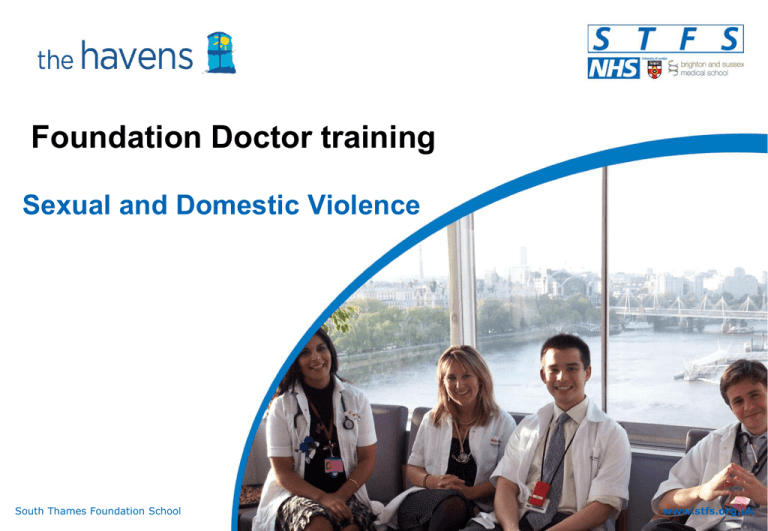
Foundation Doctor training
Sexual and Domestic Violence
South Thames Foundation School
www.stfs.org.uk
QUIZ
In groups of 2-3, work through the quiz sheets
South Thames Foundation School
www.stfs.org.uk
Quiz answers
•
How many women are killed every week by a current or former partner?
Answer: 2
•
What percentage of women in England & Wales say they have been physically assaulted by a
partner at some point?
Answer: 20%
•
What percentage of domestic violence cases occur for the first time during pregnancy?
Answer: 30%
•
What percentage of UK rapes are committed by a woman’s current or former partner?
Answer: 54%
•
What percentage of children living in UK refuges have been abused by their father?
Answer: 70%
South Thames Foundation School
www.stfs.org.uk
•
What percentage of domestic violence occurs when children are in the same or next room?
Answer: 90%
•
What is the cost to the NHS of dealing with physical injuries alone caused by domestic
violence?
Answer: £1.2 billion
•
What’s the biggest physical health difference between abused and non-abused women?
Answer: More gynaecological problems
•
What percentage of women from the age of 16 have experienced sexual assault?
Answer: 20%
•
According to the Home Office estimates, how many women are raped in the UK every week?
Answer: 2,000
South Thames Foundation School
www.stfs.org.uk
Definitions
Rape
•
This is the intentional penetration by the penis of the vagina, anus or mouth of another person without
consent.
Assault by penetration
•
This is the intentional penetration of the vagina or anus with part of the body or anything else without
consent.
Sexual Assault
•
This is intentional sexual touching without consent.
Consent
•
A person consents if s/he agrees by choice and has the freedom and capacity to make that choice. No
defence if the child is aged 13 years or younger. Possible reasonable belief if child is aged 13 – 16 years
old.
Domestic Violence
•
Any incident of threatening behaviour, violence or abuse (psychological, physical, sexual, financial or
emotional) between adults who are or have been intimate partners or family members, regardless of gender
or sexuality. This includes issues of concern to black and minority ethnic (BME) communities such as so
called 'honour based violence', female genital mutilation (FGM) and forced marriage.
South Thames Foundation School
www.stfs.org.uk
Recognising abuse
• Co-vulnerabilities common, eg age, disability, isolation, alcohol
• Repeated presentations eg with abdominal pain or non-specific
symptoms
• Always with partner who seems concerned, but takes over and
is reluctant for patient to be seen alone
• Recurrent injuries / explanation implausible
• Remember – anyone can be a victim, and anyone can be a
perpetrator (regardless of background, profession, etc)
South Thames Foundation School
www.stfs.org.uk
Exploring abuse
Have you seen anyone who has been abused or
assaulted?
Were there any questions you
found it especially useful to ask?
South Thames Foundation School
www.stfs.org.uk
Exploring abuse
• Privacy and sensitivity
• Setting the scene first, eg:
– ‘how are things at home?’
– ‘I am concerned that we have already seen you in A&E
three times this year . . and it is important that I ask
about your safety’
– ‘I am concerned that this injury seems to be more
severe than I would expect from tripping…’
– ‘it is good that you have asked for emergency
contraception . . can I just ask whether the sex that
happened was with your consent?’
– ‘are you safe to go home?’
Many different questions can be used to explore.
The HARK questions are one model, developed for use in
general practice.
• H
HUMILIATION
– In the last year, have you ever been humiliated or emotionally
abused in other ways by your partner or ex-partner
• A AFRAID
– In the last year, have you been afraid of your partner or ex-partner?
• R
RAPE
– In the last year have you been raped or forced to have sexual
activity of any kind
• K
KICK
– In the last year, have you been kicked, hit slapped or otherwise
physically hurt by your partner
Role plays with scenarios
• Each of you will be given a sheet with 1 ‘doctor’ and 1
‘patient’ scenario, and a sheet of possible questions
to ask
• Working in pairs, take it in turns to play each role for 5
minutes
• In your pairs, briefly feedback to each other:
– what went well?
– was anything difficult / made you feel awkward?
• Think about what next steps might help the patient in
each scenario?
South Thames Foundation School
www.stfs.org.uk
Break for role plays and feedback in pairs
South Thames Foundation School
www.stfs.org.uk
Feedback after role plays – important
considerations for all scenarios
Always ask for advice eg senior doctor / safeguarding lead
(senior nurse will know who this is)
South Thames Foundation School
www.stfs.org.uk
Good documentation
– detailed, objective, legible, date
and time, signature and name in
capitals
– record words used verbatim eg ‘I
said no but he wouldn’t listen’
– record details of any assault eg
‘kicked twice in abdomen’ rather
than ‘assaulted’
– record injuries on body maps if
necessary (in case you are later
asked for a police statement)
Feedback after role plays –
Scenario - Amy
• Amy has presented to A&E asking for emergency
contraception. She is tearful and has brought a young child with
her
•
Last night her husband raped her while her 3 year old daughter
was in the same room asleep
• What next steps might be helpful?
South Thames Foundation School
www.stfs.org.uk
Interventions for Amy
• Is she safe to go home?
• Emergency contraception
• Discussion with senior colleagues / safeguarding staff as
regards child
• Does she want to report to police / local sexual assault referral
centre (SARC)?
• Sexual health referral / follow-up
• Discussion about local domestic violence services
• Good documentation
South Thames Foundation School
www.stfs.org.uk
Scenario - Paul
Paul is brought in by ambulance with the police following a
severe physical assault by a group of young men. Besides his
fractured ribs and pneumothorax, he was anally raped by three
of them. He is very upset, concerned about how he will tell his
girlfriend, and worried about whether he could have caught HIV
• Next steps?
South Thames Foundation School
www.stfs.org.uk
Interventions for Paul
• Post-exposure prophylaxis against HIV (as soon as possible/
within 72 hours)
• Sexual health follow-up
• Does he want to tell police / report to SARC?
• If not going to SARC, other sources of support for him (and
partner)
• Good documentation
South Thames Foundation School
www.stfs.org.uk
Scenario - Mrs Brown
• Mrs Brown was admitted following a fall, and is bruised on her
upper arms and backs of her legs, with a bite mark on her
shoulder
• She is a retired widowed headmistress living with her son and
daughter-in-law and their child, who has cerebral palsy. Since
breaking her wrist last month she has needed more help, and
her daughter-in-law has become frustrated and took it out on
her by hitting and biting her. Mrs Brown fell last night in an
attempt to get away from her
• Next steps?
South Thames Foundation School
www.stfs.org.uk
Interventions for Mrs Brown
• See Mrs Brown without any of her relatives present
• Management of injuries including human bite
• Safeguarding adults team (and safeguarding children team re
grandson)
• Ask her what action she would like to take eg police / not go
home
• If she does not want to go home, social services
• Good documentation
South Thames Foundation School
www.stfs.org.uk
Scenario - Fatima
• Fatima, aged 17, comes to see the GP with her 45 year old
husband. He does all the talking, although she can speak
English, and says she is pregnant. Fatima makes no eye
contact and looks thin and withdrawn
• Her marriage was arranged against her wishes. Her husband
does not let her out alone, and has sex with her against her
wishes several times a week, and hits her if she refuses. She
is only allowed food if she has done all the housework for her
mother-in-law, who lives with them
• Next steps?
South Thames Foundation School
www.stfs.org.uk
Interventions for Fatima
•
•
•
•
See Fatima without her husband or other relatives
Ask senior colleague
Confirm pregnancy and document any injuries
Find out what she would like to do as regards to pregnancy
and husband – but consider breaking confidentiality (following
advice) for her safety so that police are informed
• Provide information about domestic violence services
• Make TOP referral / involve antenatal team and safeguarding
midwife
• Involve safeguarding children team (as under 18 plus unborn
child)
South Thames Foundation School
www.stfs.org.uk
Other resources
Local resources for patients (and staff)
Trainer - Research and identify local resources (useful contact names and
numbers for your area) and place in this slide for information:
•Use the list of resources/local services in the pack to identify your local
domestic and sexual violence services
•List your nearest SARC/Haven
•Contact your local DV or MARAC co-ordinator(s) as they are the best source
of information. Where not in place, Safer Neighbourhood teams and
Community Safety Teams should be knowledgeable, as are national DV
helpline staff
For further resources, please go to
http://www.stfs.org.uk/faculty/trainingabout-sexual-and-domesticviolence
South Thames Foundation School
www.stfs.org.uk

